London – The Elite Women speak
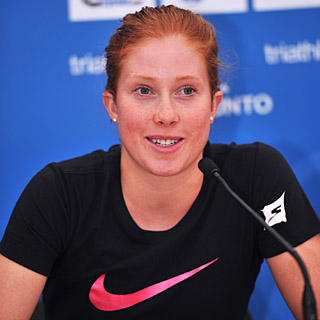
If you are an Australian woman and your name is Emma, things are looking good. But no Olympic slot is secure until they cross the line in top three. And still that might not settle things for the talent rich Aussie women. The talented American women have a strong shot at two top 9 finishes and the Olympic slots that go with such a performance. With a small Swedish WCS contingent, Lisa Norden can relax and sample the sites on the Olympic course. And while fighting a mysterious hip injury has throttled back expectations for the sensational Canadian Paula Findlay, she seems certain to make the starting line next year in the Olympics.
Now hear what some of the contenders have to say.
Paula Findlay
Paula Findlay has been the sensation of the ITU World Championship Series, breaking into fame a year ago winning the London event and Kitzbuhel after that. This year she started with a bang , winning three more WCS events – then hit a hitch with a mysterious hip malady that forced her to withdraw from a highly anticipated home town World Cup at Edmonton.
Slowtwitch: What is wrong with your hip?
Paula Findlay: We're still a little unsure what the diagnosis is because the MRI was unclear. We saw the MRI and thought it was maybe a strain in my right hip.
ST: What was the feeling when you were starting to run?
Paula: It was sort of a dull ache.
ST: What led you to not start in your home town race at Edmonton?
Paula: It was the worry that I would do worse damage.
ST: How does it feel now?
Paula: I am running pain free now. But it's only been five days. Honestly I haven't trained running for four weeks now. I'd love to be competitive with the top girls but I am going to think about next year. I am here to learn the course. I'd love to win but I have to think about next year and not get too riled up over this race. Unfortunate it happens now.
ST: If things go bad will you drop out?
Paula: I might pull over if there is a risk for Beijing. I love racing here in London so it that makes it really hard. I do not want to quit and I am running pain free right now, so I hope it works well.
ST: What degree were you surprised by your great success last year and this?
Paula: Very surprised. I came into this race last year ranked 53rd, I would have been happy with a top 15 finish. And that win kind of kicked off a string of good results.
ST: I recall you had a nice 4th place finish at Hy-Vee in June of 2010.
Paula: Yes. And I won Monterrey World Cup. So I was not surprised I was racing well. But I definitely did not expect to win a race of this caliber. I'm not going to say it is no longer surprising as I go along. But I am not as shocked any more.
ST: Who has inspired you as an athlete?
Paula: Lots of people. Obviously as I am from Canada, I watched Simon Whitfield at the 2000 Olympic Games. That was before I started the sport. And Kristen Sweetland won Junior Worlds and I was a junior at the same time. So she was always a great inspiration to me — watching her beating me by minutes and minutes. Just any athlete who is dominant and humble at the same time. Emma Snowsill, Emma Moffatt, all the world champions.
Emma Snowsill
The most decorated ITU short course champion [three world titles and a g\Grand Final winner plus 2008 Olympic champion] is, at age 30, undergoing recovery from injury and what might be termed a competitive makeover. This year, the once dominant Snowsill came out on the short end of a three Aussie Emma duel at Hamburg. But the woman known as Snowy always managed to perform at her unparalleled best in the big ones.
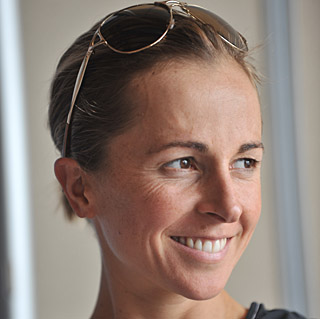
ST: Fantastic race with the three Emmas in Hamburg. Also you’ve spent a bit of time to get back to your race best?
Emma Snowsill I had a foot injury in the off season. It obviously puts you on the back foot. Just overtraining. Probably going too hard too early. So you are always looking for a way to reinvent yourself, so to speak. But the training is going really well.
ST: Not because you were adjusting to your foot injury?
Emma: No. You know the sport is evolving and you have to find ways to change if you don't want to get left behind. So you just want to pick back up on the training and with the racing. You know there is a lot more going on in the races. I had been getting left behind on the swim and that is the first thing I had to change.
ST: What do you mean the racing has evolved?
Emma: There are just a lot more girls in the first rank. The fields are faster and deeper. The swims have become really intense.
ST: ITU commentator Barry Shepley said your swim was incredible after putting in a lot of work on it.
Emma: I was getting caught up in the swim part of the race and if you are not in the first swim pack, the race gets on without you. I knew I was swimming well. But I had to get the confidence back and push my way in the actual races.
ST: Is this memory of the struggle teaching something to build on?
Emma: Sure a lot of confidence comes from just being in the water and being in the mix again. My training is going well. It is always difficult because improvements in training are not always translated immediately in the races. But now things are going well and the body is strong. So…
ST: Other people would suffer a significant blow to their ego if they went through hard times after dominating the sport. You never seem to buy into that that natural human feeling?
Emma: You have to ignore those feelings. Racing's racing. You can only control what you can control. No point being upset or getting distracted as you know you are changing things. That is something I know and I knew I had to go about doing it.
There is no point complaining. Sometimes it takes a bit longer than what you would like. But when it comes together, you realize that what you've been doing is right.
ST: For a six year period beginning in 2003, you dominated and were the best woman triathlete on the planet. Now things are different. You don’t win every duel. What has changed for you?
Emma: I continue to improve within myself. Competition is improving me. Also I have to make sure I am ready to race with them.
ST: Is this as much fun as when you were on top of the world?
Emma: Yeah it is definitely a challenge and I am enjoying it. I can see there are a lot of young girls coming up and I see myself and what I was like when I first started and I have to use that hunger and determination even though I've been around a little longer now. And to get out there and give it my best shot.
ST: How important is this race?
Emma: In our selection process, making the podium is really important for this race and we also have Beijing which is very important as well.
ST: It's a little confusing?
Emma: We all have to take one race at a time. Sure we are all aware of the selection process. So it is all about results — and that is what I like as well.
ST: You very good friends with your toughest competitors. is there a tiny bit of jealousy or envy beneath the polite surface?
Emma: You only feel aggression when in race mode. It is not against anyone else. It is pushing myself to the limit regardless if it is a teammate. The beauty is when you are racing and it is with friends, and one day you can't be on top it is great to see them have the glory as well. Nice to see Emma Moffatt win some. It is all good.
Laura Bennett
Bennett has won four ITU World Championship medals, the $200,000 Hy-Vee Triathlon World Cup, and took 4th at the 2008 Olympics while fighting off injuries.
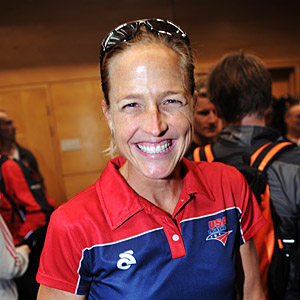
ST: What did you do to prepare for this?
Laura Bennett: Just the usual time planning the biggest race of the season — build the season properly and peak here.
ST: What is different about racing during this 2012 Olympic chase?
Laura: What I found is that 6th through 10th is the new 3rd to 5th. That is not great. But it is a bit of a process of modern ITU racing.
ST: What did you go through to recover after the 2008 Olympics?
Laura: I had a year and a half down after the Olympics. My injury was more of a strain on my plantar and adaptation to change in my position on the bike took longer than expected. The correction was more muscular, to build up my muscle at the same time. It took a while and demanded a lot of focus just on that.
ST: What was tougher, the pain or taking so much time to get back to your prime condition?
Laura: It was more the time it took to transition. All 2009 I had to run in pain. I had to scale back and pull myself out of competition a bit since 2010. Now I am pain free. I worked on my weakness with Wendy McClure a physical therapist in Boulder I bring her some of my race videos and tell her I want to work on this and that. She helped me to do the training I need to win.
ST: Lot of good American women. All are good swimmers, all good bikers, and then it comes down to the run. Is it good in a way to work with your fellow Americans in races?
Laura: Sometimes it works out and it is good. But you race with the people who are available, wherever they are from. It doesn't matter just who it is. You just focus on who is in front of you.
ST: What did you take away from the fact that Sarah Groff beat you 3 times in WCS races this year?
Laura: Sarah has been working a long time and she deserves to get some payoff. I think she has found her form and it is showing up this year. That is good.
ST: Where do you find the little bit extra for the big races?
Laura: These WCS races are like World Championships and have a little more priority. This is a big race and I love big races. So that is all it takes to get me motivated.
Lisa Norden
Norden finished second in the inaugural 2009 World Championship Series and pushed champion Emma Moffatt right to the end at the WCS Grand Final on the Gold Coast. Sweden's champion has been hampered by an inflamed tendon, but is using this race as a scouting expedition for the Olympics.
ST: What's wrong with your foot?
Lisa Norden: I've been out with an injury. Inflamed tendon in the foot. It is coming along good, but I had to take time off from training. So my training is off. Very much I'm afraid.
ST: When did it start?
Lisa: It started a bit in January. So I've been dealing with it a long time. It was a little bit of an injury from January to May. Then after Madrid, I decided this is not working. So I went to see a sports medicine specialist and they diagnosed it. If things feel bad, I will pull out, I am concerned about next year. This year I am more here as a tourist to see the course.
ST: Is there any danger to your Olympic qualification for Sweden?
Lisa: The Swedish team is not massive, and I am pretty much qualified. So it is all good. I want to see and experience the Olympic course and see how it goes. I was 2nd here two years ago to Nicola [Spirig].


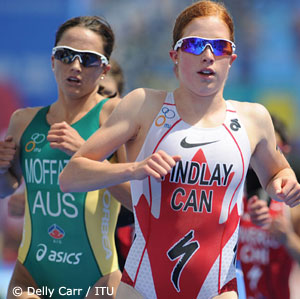
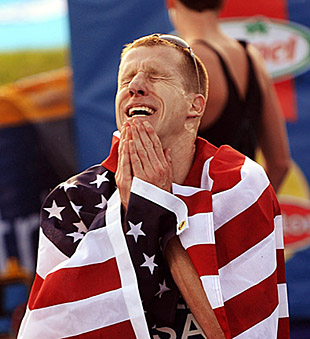
Start the discussion at slowtwitch.northend.network